Business
Argentina’s President Milei divided his nation but won over Trump
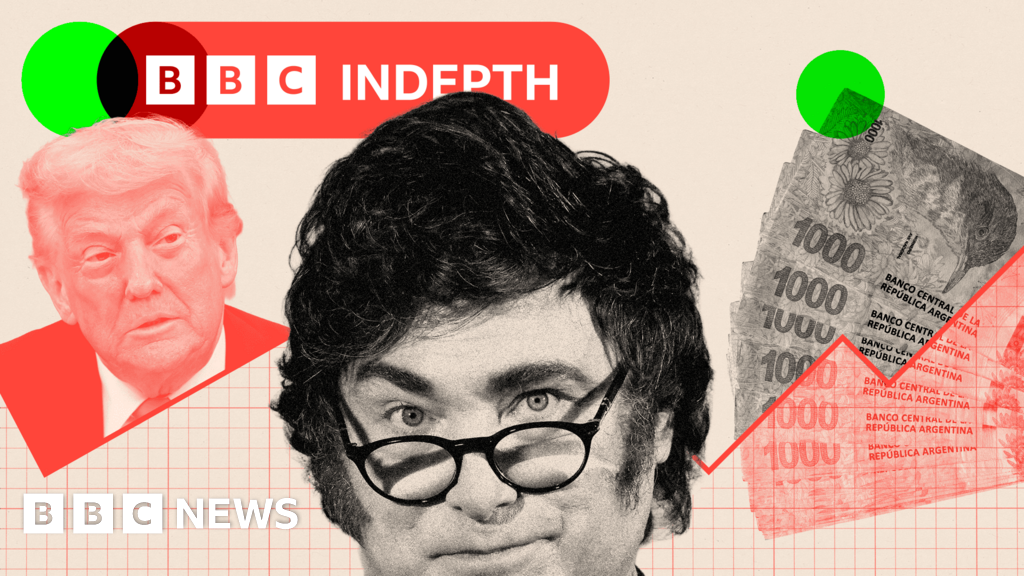
 Ione WellsSouth America Correspondent
Ione WellsSouth America Correspondent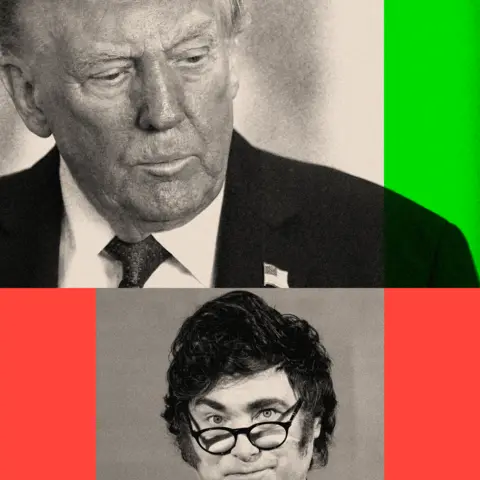 BBC
BBCBuenos Aires, September 2023. Hundreds of people crowded around to wave flags and film on their phones. The man with unruly hair and sideburns in the centre of them, clad in a black leather jacket, hoisted a roaring chainsaw above his head.
This was an election rally taking place in the San Martín area of the Argentine capital a month before the presidential election – and the metaphor was explicit.
The candidate Javier Milei believed the state was far too bloated, with annual debts that were bigger than Argentina’s entire annual economic output.
Rather than ‘trimming the fat’, as some politicians delicately put it, he said he would take a chainsaw to ministries, subsidies and the ruling political class he derided as “la casta” – the caste.
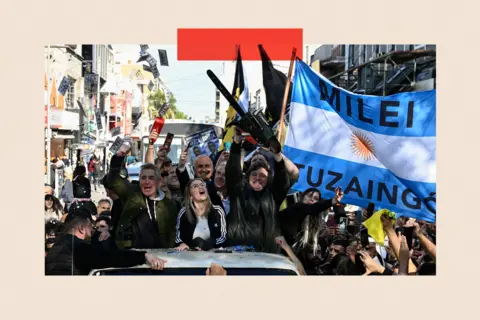 Getty Images
Getty ImagesMilei had form for stunts. In 2019, he dressed up in a “libertarian superhero” costume, purporting to be from Liberland – a land where no taxes are paid. In 2018, he smashed a piñata of the Central Bank on live television.
According to official data, inflation in 2023 topped 211% annually – Milei took office in December of that year. Roughly 40% of the population lived in poverty. Years of high public spending, and a reliance on printing more money and borrowing to cover deficits, had left the country in a cycle of debts and inflation.
Yet nearly two years on, the headline figures are vastly different: Argentina recorded its first fiscal surplus in 14 years and inflation, which had hit triple figures annually, has tumbled to roughly 36%.
The UK Conservative party leader Kemi Badenoch called the measures Milei has taken a “template” for a future Conservative government. And in the US, President Donald Trump described Milei as “my favourite president”.
They will meet in Washington on Tuesday.
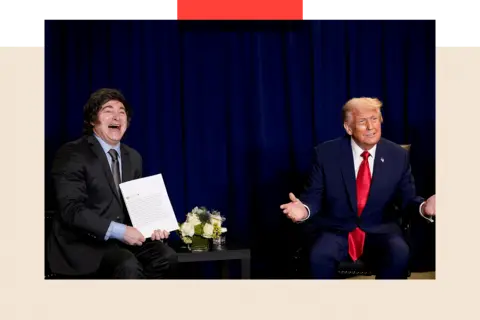 Reuters
ReutersForeign investors regained confidence in Argentina too. Although that recently slipped, Washington’s decision last week to swap $20bn (£15bn) in dollars for pesos, effectively propping up Argentina’s currency with International Monetary Fund (IMF) backing, is a sign Milei’s fiscal shock therapy has appeased international lenders. Trump and Milei’s meeting will hail the deal.
Yet for all the international praise, this is just one side of the story. On the streets there have been heated protests over Milei’s reforms, with police firing tear gas, rubber bullets and a water cannon during clashes.
“He said in his campaign that this adjustment would be paid for by ‘la casta’ – the wealthy, the politicians, the evil businessmen,” says Mercedes D’Alessandro, a left-wing economist and senate candidate.
But, she argues, the result was less money for pensioners and hospitals. “The adjustment in the end was directed at the working classes, not the caste.”
 Reuters
ReutersMilei’s critics argue that the price of his changes have been recession, job losses, weaker public services and declining household budgets. And now some economists say the country could be about to enter a recession.
Milei has created a paradox.
On paper, his chainsaw has achieved some of the macroeconomic successes he set out to do. But Milei has lost political support and that has spooked the markets, which in turn has destabilised his economic project.
With midterm elections looming on 26 October, Argentina is about to deliver its verdict: will Milei be punished for doing what he set out to do — and could losing political support completely unravel his economic gains?
Argentines feeling the cost
Around 700 miles from the capital in the Misiones province, tea farmer Ygor Sobol looks anxious. “We’re all going backwards economically,” he says. “I had to close the payroll. Now I am completely without employees.”
For three generations his family has grown yerba mate, a drink popular with Argentines, but since Milei deregulated his industry by scrapping minimum prices, he says that his crops have become worth less than the cost of producing them.
Now, Mr Sobol says he can’t afford to do basic tasks like cleaning and fertilising his plantation. And with the business making a loss, he’s deciding what his family will have to go without too.
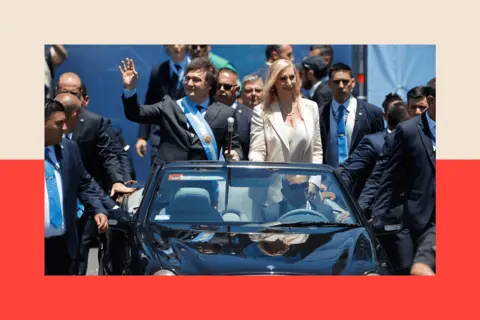 Shutterstock
ShutterstockArgentina’s multibillion dollar textile industry is also affected. Luciano Galfione, chairman of a non-profit for the sector Fundacion Pro Tejer, describes “daily” closures and job losses.
Unlike Trump’s approach of raising tariffs to promote “America First”, Milei cut tariffs and other criteria for imports.
“I have environmental controls, labour controls – we don’t pay people $80 (£60) a month, or have 16-hour work days that might be allowed in places like Bangladesh or Vietnam. This creates an unequal playing field,” Mr Galfione argues.
He believes that boosting imports has battered domestic producers. “Our sector lost more than 10,000 direct jobs. If you add indirect jobs, there are many more.”


Mr Galfione also blames rising costs of utilities, health and schools for reducing the disposable income of average people, and in turn making them less likely to buy clothes.
And yet amid it all, Milei is adamant that his measures will improve the lives of ordinary Argentines.
‘Everything was a huge mess’
In the run-up to the election Milei had said there was no alternative to big cuts.
As well as the soaring inflation, vast government subsidies had kept energy and transport prices down. Public spending was high, even before the Covid-19 pandemic. Price controls set fixed prices for certain goods. Argentina, still, owes £31bn in debt to the IMF.
“The demand for public spending was brutal,” argues Ramiro Castiñeira, an economist at the consultancy Econométrica who supports Milei.
“Society seemed willing to live with so much inflation. Or didn’t recognise that inflation was a product of so much public spending.”
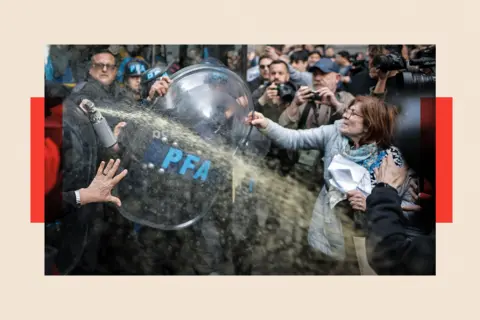 EPA – EFE/REX/Shutterstock
EPA – EFE/REX/ShutterstockInflation ate away the peso currency’s purchasing power. Many ordinary Argentines handed over disproportionate sums of pesos to illegal street traders to buy dollars, fearing their money would lose value overnight.
“Everything was a huge mess,” explains Martin Rapetti, an economics professor at the University of Buenos Aires and executive director of think tank Equilibria.
“People felt money slipping like water through their fingers.”
For many economists, drastic change (even if painful) was essential to restore credibility. And Milei promised radical change.
He went viral for ripping government ministries such as Culture and Women off a whiteboard while shouting ‘afuera!’ – ‘out!’
Among other austerity measures, he halved government ministries, cut tens of thousands of public jobs, slashed budgets including for education, health, pensions and infrastructure, and removed subsidies – spiking utility and transport prices.
His initial devaluing of the peso by 50% caused inflation to spike but then it fell as people spent less and demand fell.
 EPA/Shutterstock
EPA/Shutterstock‘Echoes of Thatcherism’
When I met him in April 2024 at his office, there were sculptures of him with a chainsaw on display and coasters showing Margaret Thatcher’s face. Thatcher is loathed by many people in Argentina owing to the Falklands War, but Milei told me he admired her and that she was “brilliant.”
Last month one British newspaper described Milei’s own approach as having “echoes of Thatcherism”.
Miguel Boggiano, an economist on Milei’s economic advisory board, is full of praise for Milei getting inflation down and reducing the deficit. “When you bear in mind the starting point, that’s a huge accomplishment,” he says.
 Reuters
ReutersHe believes this will help alleviate poverty in the long-run and enable lower taxes, but also help people to plan their own spending more easily with inflation currently fluctuating less.
But Alan Cibils, an independent economist and former professor, warns reduced inflation is only a success if it is sustained over time which he believes will not be the case.
The outsider advantage
Javier Milei is not a career politician. Before becoming president he had two years experience as a deputy in Argentina’s Congress.
“Being so detached kind of shields him,” Prof Rapetti observes, citing a lack of “signs of empathy in public life”.
On 7 September Milei’s party lost unexpectedly badly in the Buenos Aires provincial elections. His convoy was pelted with rocks on the campaign trail. The markets panicked: foreign investors sold off pesos and bonds of Argentine government debt.
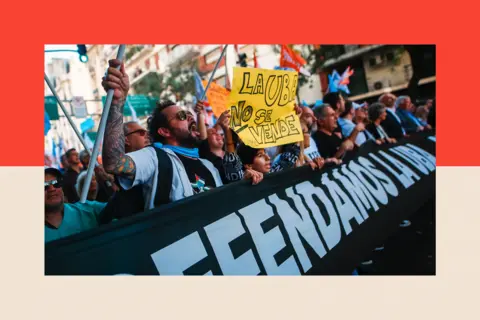 EPA – EFE/REX/Shutterstock
EPA – EFE/REX/ShutterstockFinancial markets had generally supported his economic programme. But the midterm elections were upcoming and the £15bn of debt repayments are due next year.
Trump’s £15bn currency swap lifeline has provided some stability: Argentine bonds and the peso rose in value in response to the announcement. But D’Alessandro argues that though US intervention might solve a wider problem, nothing will change in “people’s real lives”.
“We’re going to continue with no investment in hospitals, education, social programmes. This money from the United States is not going to improve Argentina’s infrastructure.”
Flawed leader or model for other countries?
Some of Milei’s supporters – like Mr Boggiano – believe there is something else at play in the round criticism of the president: In this view much of it comes down to the opposition trying to “break” what Milei has done, in order to get back into power.
“Once everyone starts to believe stability is here to stay, investment will come back,” says Mr Boggiano. “I think Milei will become a model for other countries.”
Others are unsure. “There is some stability which helps things not to explode,” said Mr Cibils. “But I think that stability is also a mirage.”
Milei had also kept inflation under control by spending the country’s reserves on propping-up the peso so it didn’t crash. Meanwhile, Argentina owes $20bn of debt next year.
One former central bank economist, who wished to speak anonymously, warns Milei’s strategy of keeping inflation down could unravel if Argentina can’t pay its debts.
“If at the end of the day we have a financial crisis that partially undoes all the effort, then it’s a failure. If it ends with social unrest, any good done will be reversed,” says the economist.
The left-wing governor of Buenos Aires, Axel Kicillof, has been touted as a future presidential candidate, long ahead of the elections in 2027. He has spoken in favour of the welfare state. Some investors are calculating whether this could mean a return to the days of big spending.
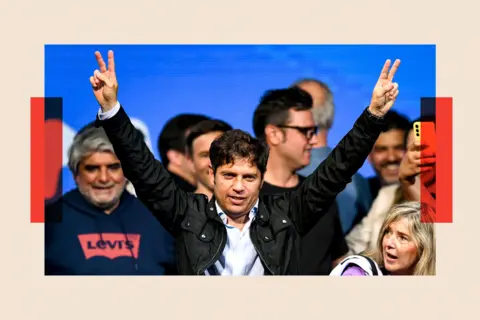 Getty Images
Getty ImagesAs to the question of whether Milei has succeeded, the answer largely depends how you define success – and who it is for.
Many workers see shuttered factories, rocketing bills, and a vanishing safety net.
Meanwhile, some investors see a success story of fiscal discipline, tamed inflation, an ally in Washington and simply a “normalisation”.
But even as leaders abroad watch Milei’s experiment with fascination, politics may explain why few are unlikely to copy it.
If normal people lose faith in what he is doing, markets will also lose confidence that his programme is sustainable – and that could wipe out even the ‘macro’ successes.
“He has no political expertise, and I think you need it,” Prof Rapetti argues.
Still, he believes it is too early to judge: “We are in the middle of his term… The story hasn’t finished.”
Top picture credit: WPA Pool/Getty Images, Bloomberg via Getty Images

BBC InDepth is the home on the website and app for the best analysis, with fresh perspectives that challenge assumptions and deep reporting on the biggest issues of the day. And we showcase thought-provoking content from across BBC Sounds and iPlayer too. You can sign up for notifications that will alert you when a BBC InDepth story is published – find out how to sign up here.
Business
Budget 2026: Who Delivered The Longest Budget Speech In India?
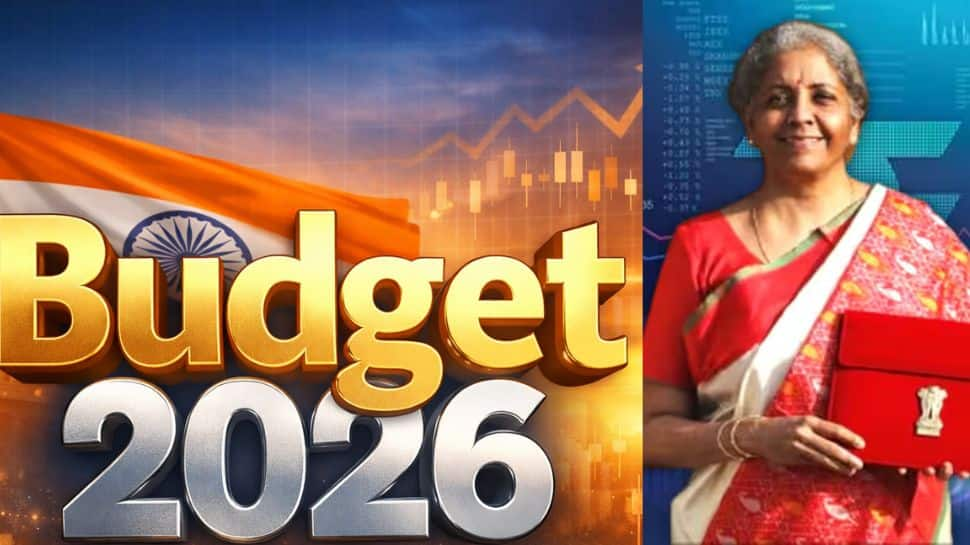
New Delhi: Every year, the Union Budget draws nationwide attention as it outlines the government’s plans for the economy and public spending. Traditionally presented on February 1, the Budget will be tabled by Finance Minister Nirmala Sitharaman on February 1, 2026, at 11 am, as confirmed by Lok Sabha Speaker Om Birla.
A Record-Breaking Budget Speech
Nirmala Sitharaman created history by delivering the longest Budget speech in India in 2020, which lasted 2 hours and 42 minutes. The marathon address introduced several major announcements, including a new income tax regime and the much-awaited initial public offering (IPO) of Life Insurance Corporation (LIC).
However, during the course of the speech, Sitharaman felt unwell, following which Lok Sabha Speaker Om Birla read out the remaining two pages on her behalf. Notably, the 2020 speech had already surpassed her own 2019 record, when she spoke for 2 hours and 17 minutes. In contrast, her 2024 Interim Budget speech was much shorter, lasting just 56 minutes, her briefest Budget address since taking charge as Finance Minister.
Understanding the Union Budget: What It Means for India
The Union Budget is a yearly financial statement presented by the Finance Minister in Parliament under Article 112 of the Constitution of India. It outlines the government’s estimated income and spending for the upcoming financial year, giving a clear picture of how public funds will be raised and used.
Along with revenue and expenditure details, the Union Budget also announces proposed changes in taxes, key focus areas for development, policy initiatives, and major economic reforms. It serves as a roadmap for the country’s economic direction in the year ahead.
Over the years, Budget speeches have evolved to reflect India’s changing economic needs and challenges. All eyes are now on Finance Minister Nirmala Sitharaman, who has been leading the Finance Ministry since 2019 and is set to present her eighth Union Budget on February 1.
Business
Fundamental shift from savers to investors: What Indian households are doing with their money? – The Times of India

For years, Indian families have saved in gold, stored cash, and put money in tangible assets to safeguard their future. But now, there’s a noticeable shift is visible as more Indian households are moving away from old saving ways and putting their money to work through investments.India’s total household wealth, by the end of FY25, stood at Rs 1,300-1,400 lakh crore. Of this, investable financial assets stand at almost 35% of the total, growing at nearly 17% over the past five years, according to a recent Bain–Groww report, titled How India Invests.
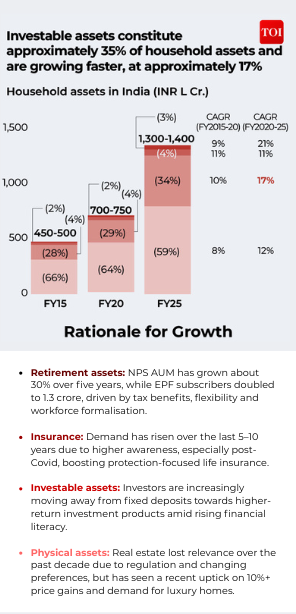
Household wealth has gone through a shift since the Covid era. Indians have moved from traditional fixed deposits toward market-linked instruments like mutual funds, pension funds and listed equities, which are growing at a fast rate, far outpacing deposits growth.Over the last five years, individual investor base in the country has expanded sharply, going from around 3 crore investors in 2019 to over 12 crore by 2025, according to the Market Pulse December 2025 report by the National Stock Exchange of India (NSE), India. In 2025 alone, households invested a whopping Rs 4.5 lakh crore into equity markets, both directly and indirectly through mutual funds. This, pushed the overall household investment in equities since 2020 to around Rs 17 lakh crore. In FY25, mutual fund assets under management (AUM) held by individuals reached Rs 41 lakh crore, driven by double participation by households, going from 5–6% to 10–11%, and increasing popularity of systematic investment plans (SIPs).According to RBI data, equity formed 1.3% of household savings in FY2021, but its share increased to 2.1% by FY2025. Similarly, mutual funds recorded a significant jump over the same period, with their share rising sharply from 2.1% to 13.1%. Contributions to provident and pension funds also grew, increasing from 16.6% in FY2021 to 22.2% in FY2025.In contrast, traditional savings instruments saw a decline. Small savings, excluding PPF, fell from 7.9% to 6.5%, while the share of currency in household savings dropped steeply from 12.6% to 5.9%. Life insurance also witnessed a reduction, with its share slipping from 18.7% in FY2021 to 15% in FY2025.Gradually, households reduced their dependence on bank deposits and insurance-based savings. Instead, investments in pension schemes and mutual funds have gathered pace, pointing to a broader shift towards market-linked financial products.
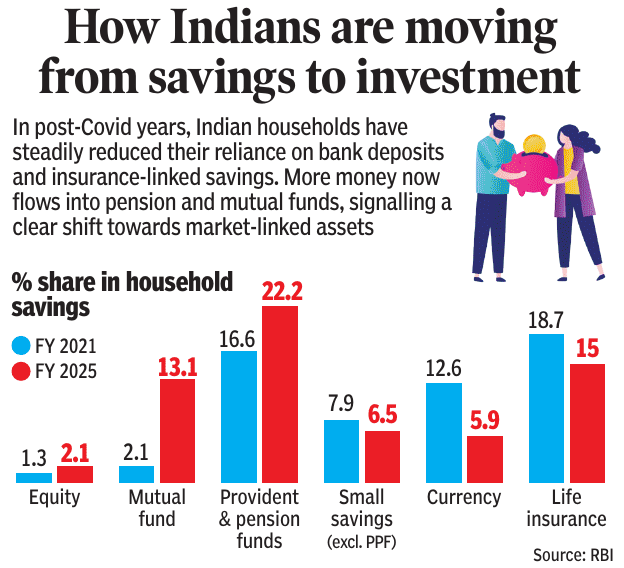
Mutual funds, stocks, SIPs: Who is choosing what?
Salaried households show a clear preference for mutual funds, particularly through SIPs, reflecting a tilt toward disciplined, professionally managed investing aligned with long-term financial goals, according to the Bain report. In contrast, business owners display a stronger inclination toward direct equity investments, marked by higher trading frequency and a greater appetite for risk. Within mutual funds, SIPs remain the dominant entry route, while lump-sum investments are steadily gaining traction as investors mature, build market confidence, and increase their risk tolerance.
Interest in investing spiked after Covid?
Covid didn’t just change daily life, it changed how Indians invest. Retail participation in the stock market rose sharply after the pandemic, driven by a mix of high liquidity, lower household spending during lockdowns and the flexibility of work-from-home, Rohit Shah, Certified Financial Planner and founder of Getting You Rich told TOI. Shweta Rajani, head of mutual funds at Anand Rathi Wealth Limited, pointed out that mutual funds made up only 4–5% of household financial assets between FY15 and FY20, but this share nearly doubled from around 5% in FY20 to close to 10% by FY25. At the same time, direct equity investments also grew sharply, rising from about 4% of household assets in FY20 to around 9% by FY25. “Together, these shifts indicate a clear move away from traditional savings instruments towards market-linked investments, indicating investors are comfortable with equity as an asset,” the expert added.Meanwhile, Nirav Karkera, head of research at Fisdom believes that Covid acted more as an accelerator than a starting point as the shift had already begun after demonetisation. The switch made Indians comfortable with digital payments and later with digital investing. By the time the pandemic arrived, systems such as Aadhaar-based KYC, easy online transactions and awareness campaigns like Mutual Fund Sahi Hai had removed most barriers. “When the pandemic hit, investors suddenly had the time and urgency to reflect on their personal finances. More importantly, the infrastructure to execute decisions with almost zero friction already existed. Willingness, ability and accessibility came together and translated into action. The sharp and mostly linear market recovery that followed further strengthened confidence, pulled in fence-sitters and accelerated the broader financialisation of household assets that was underway,” Nirav added.
Change in India’s risk appetite
India’s shift from saving to investing is being driven less by thrill-seeking and more by necessity, experts said. Traditional savings instruments are increasingly failing to protect wealth, as post-tax returns often fall below inflation, steadily eroding purchasing power. “What looks like rising risk appetite is partly a change in the understanding of risk itself,” said Karkera, adding that investors now see the risk of staying idle and falling behind as greater than the risk of market volatility. This shift has been reinforced by deeper financial awareness, easier access to investing through fintech platforms, and stronger regulation, said Rajani. The expert further noted that SIPs, simplified KYC and digital onboarding have lowered entry barriers, while a generational change is reshaping attitudes, older investors prioritised capital preservation, but younger earners, facing higher inflation and lower real interest rates, are more focused on long-term wealth creation using growth assets. However Shah cautioned that rising participation does not always mean better risk management. “Four structural factors drive this shift: financial literacy campaigns, fintech accessibility reducing entry barriers, higher equity allocations in mutual fund inflows, and rising per capita incomes. Yet risk appetite may be overstated. Data on retail trading patterns shows concentration in speculative segments, suggesting investors confuse market participation with risk management. Many haven’t weathered a bear market, leading to underestimation of downside volatility,” Shah told TOI.
Here’s what is driving the investors:
A combination of demographic change, regulatory support, digital access and strong market returns has accelerated India’s move from traditional savings to investing.

Demographic changesYounger investors are driving India’s shift from traditional savings to investing, with NSE data showing that more than half newly registered investors are below 30. At the same time, women are steadily increasing their presence in financial markets. As of November 2025, women account for nearly a quarter of India’s investor base, with their share in the NSE’s individual investor pool remaining stable at almost 24%.Digital transformationDigital platforms have emerged as the main entry point for retail investors in the country, with almost 80% of direct equity investors and around 35% of mutual fund investors investing through digital channels. According to the Bain report, driven by app-based onboarding, paperless KYC and fintech-led distribution, platforms such as Groww, Zerodha and Upstox have simplified investing, brought in millions of first-time investors, and together account for almost 80% of India’s retail equity investor base.Going beyond metro citiesInvestment activity is increasingly coming from smaller cities. Around 55–60% of new SIP registrations now originate from B30 cities, highlighting the growing role of Tier-2 and Tier-3 regions in driving mutual fund growth.Rising financial literacy and awarenessThe spread of regional and digital financial content across YouTube, Instagram and fintech platforms has made investing concepts more accessible. Regulatory awareness campaigns by AMFI — including “Mutual Funds Sahi Hai” and “Bharat Nivesh Yatra” — have further boosted investor education.Market performance reinforcing trustSustained returns have strengthened long-term investor confidence. The Nifty 50 and Sensex delivered 10–15% returns over the last decade, while equity-oriented mutual funds have significantly outperformed traditional fixed deposits over the past five years.
Women and GenZ hit investment markets
GenZYounger investors are emerging as key drivers of the shift from traditional savings to investment. Data from the NSE shows that more than half, almost 56%, of newly registered investors are below 30. Mutual fund trends also reflected this shift, with 55% of investors under 40 and the 20–30 age group emerging as the fastest-growing segment in the top 100 cities.Comparing the contribution of GenZ and millennials, Rohit Shah said that according to the data, both cohorts contribute meaningfully, but with distinct patterns.“GenZ dominates app-based trading volumes due to digital nativity and lower capital requirements. Millennials drive mutual fund and long-term investments through larger disposable incomes and established goals.” He further added, after the market expansion happening after the pandemic, benefited both simultaneously, “making it difficult to isolate one generation as the primary driver. The real story lies in democratization across age groups, not generational dominance.The equity shift is broad-based across age groups according to AMFI’s age-wise distribution of individual investor AUM. Gen Z investors (under 25 years) have allocated nearly 65% of their assets to equity, Rajani told TOI. Millennials (25–44 years), meanwhile, “show the highest equity allocation at approximately 75.5%, and importantly, even investors above 58 years of age maintain a meaningful equity allocation of around 54%”Nirav Karkera, head of research at Fisdom, highlighted a different approach, saying that while millennials currently lead the equity surge, the baton is likely to pass to Gen Z in the coming years. “Gen Z is still in the early stage of their earning life, where consumption tends to dominate. At the same time, they are arguably the most financially aware generation we have seen. They understand the language of money much earlier than millennials did at their age. Once their incomes rise and they have surplus capital, they are likely to play an even bigger role than millennials in shaping investment patterns. For now, millennials are doing the heavy lifting, but the baton looks set to pass smoothly to Gen Z.”WomenAs of November 2025, women account for nearly a quarter of India’s investor base, highlighting their growing presence in financial markets. Data from NSE shows that over the corresponding period, women’s share in the individual investor base has remained stable at 24.7% over the corresponding period. Among the top five states by registered investors, Maharashtra leads with women comprising 28.8% of its investor pool, up from 25.6% in FY23, followed closely by Gujarat at 28.1% (26.6% in FY23). In contrast, Uttar Pradesh, despite being the second-largest state by investor count, continues to lag, with women forming 18.9% of investors, though this marks an improvement from 16.9% in FY23.Encouragingly, nearly 53% of Indian states now report female investor participation above the national average, compared to 44% in FY23. Smaller regions are emerging as frontrunners in gender inclusion, with Goa (33.1%), Mizoram (32.4%), Chandigarh (32.2%), Sikkim (31.1%) and Delhi (30.9%) leading the way – reflecting rising financial awareness, greater workforce participation, and improved access to investment avenues among women. Mutual funds also saw rising participation from women, particularly in B30 cities, where the share of women investors climbed from 20% to 25% over the past five years. In the top 30 cities, women now make up nearly 35% of mutual fund investors as of FY25, accompanied by a sharper rise in average MF folio sizes between FY19 and FY24.
Short-term or long-term: Where are Indians putting their money?
Indian investors are participating across both short-term trading and long-term wealth building, but experts say the balance is slowly tilting toward the latter. In the immediate post-Covid phase, many first-time investors entered markets with speculative intent. However, that period helped break psychological barriers. “Once investors experienced volatility firsthand rather than hearing about it abstractly, they started building familiarity, confidence and a basic understanding of market behaviour,” said Karkera, adding that the early rush acted as a gateway to more mature participation.Rajani told TOI that the trend is driven by long term objectives rather than short term. The expert pointed to AMFI’s SIP holding-period analysis, which shows that the share of SIP assets held for over five years has jumped from 11% to 29% in the past five years, while investments held for less than a year have fallen sharply from 41% to 23%.Meanwhile Shah said that even though “retail trading volumes have grown exponentially—NSE data shows consistent month-on-month increases in F&O participation. Simultaneously, mutual fund SIP adoption remains strong, but it’s overshadowed by trading activity. With fixed deposit yields compressed by falling interest rates, investors are chasing equity returns without corresponding time horizons. The evidence suggests a bifurcation: disciplined SIP investors versus growing trading populations driven by short-term performance metrics.”
Are there any risks for the investment express?
Shah warned that many new investors entered the market during a long bull run, and historically, market corrections of 30–50% happen every 7–10 years. Therefore, a prolonged downturn could lead to panic selling, especially among first-time investors with little experience of market volatility. Meanwhile, in the short term, market ups and downs may push some investors to move money into safer options like debt funds. Investors also tend to chase assets that have done well recently, such as gold and silver. However, Rajani pointed out that these shifts are temporary and not a fundamental change. “Over the long term, the broader trend toward equity investing is expected to continue as investors looking for inflation-beating returns to meet long-term financial goals.”Karkera also highlighted that even though risks remain, they are manageable. He noted that lower equity returns or bouts of market volatility could cause short-term, speculative investors to step back, and better performance in fixed-income or real assets may temporarily pull some money away from equities. However, the larger shift is firmly in place thanks to improved investor awareness, growing digital access. “Growth may pause or plateau intermittently, but the long-term trajectory of retail participation still feels upward.”
Still room to grow
Despite the rapid shift, India continues to lag developed markets. Mutual funds and equities account for just 15–20% of household investable assets, compared with 50–60% in countries like the US and Canada, highlighting significant headroom for future growth.As the Bain report notes: Over the next decade, mutual fund AUM is projected to cross Rs 300 lakh crore, while direct equity holdings could approach Rs 250 lakh crore, supported by deeper penetration in tier-2 and tier-3 cities, regulatory reforms and investor education initiatives.
Business
Green energy exports: $10-bn green ammonia project positions India as global clean-fuel supplier; Kakinada plant nears key milestone – The Times of India

A $10-billion green hydrogen and green ammonia project at Kakinada in Andhra Pradesh is set to cross a major construction milestone, reinforcing India’s ambition to emerge as a global supplier of clean energy to markets such as Germany, Japan and Singapore.The first major equipment erection ceremony of AM Green’s Green Hydrogen and Green Ammonia Complex will be held on January 17 and will be attended by Chief Minister N Chandrababu Naidu and Deputy Chief Minister Konidala Pawan Kalyan, state government officials said, PTI reported.Billed as one of the largest clean-energy investments in India to date, the project involves a total outlay of $10 billion and is expected to generate up to 8,000 jobs during the construction phase, besides substantial high-skill employment during operations and across allied sectors including renewable energy, logistics, storage and port services.AM Green is developing India’s first and the world’s largest green ammonia complex at Kakinada, with a planned capacity of 1.5 million tonnes per annum, through the brownfield conversion of an existing ammonia-urea facility. The project will be commissioned in phases, beginning with 0.5 million tonnes per annum by 2027, scaling up to 1 million tonnes by 2028 and reaching full capacity by 2030.Once operational, the facility will enable India’s first exports of green ammonia, which is increasingly being adopted globally as a clean shipping fuel, for power generation and as a carrier for green hydrogen.The integrated project spans 7.5 gigawatts of solar and wind capacity, 1,950 megawatts of electrolyser capacity and 2 gigawatts of round-the-clock renewable power, supported by pumped hydro storage, including India’s first such facility at Pinnapuram in Andhra Pradesh.AM Green has already signed long-term supply agreements with Germany-based utility Uniper and is in advanced discussions with potential buyers in Japan and Singapore, establishing India’s first green-energy export linkages with Europe and advanced Asian economies.The project is aligned with Andhra Pradesh’s Integrated Clean Energy Policy, 2024, which seeks to position the state as India’s primary hub for green hydrogen and green ammonia. Once fully commissioned, the facility is expected to mark a structural shift from energy import dependence towards clean-energy exports, placing Andhra Pradesh at the centre of the global green-energy value chain.AM Green, backed by the founders of the Greenko Group, is developing the project through AM Green Ammonia, a partnership involving Malaysia-based Gentari, Singapore’s sovereign wealth fund GIC and the Abu Dhabi Investment Authority. Construction at the Kakinada site is already under way, placing it among a limited set of large-scale green ammonia facilities globally that meet Renewable Fuels of Non-Biological Origin (RFNBO) standards.Beyond production, the project showcases an end-to-end clean-energy ecosystem within a single state, encompassing large-scale renewable generation, round-the-clock green power backed by storage, hydrogen and ammonia production, and port-based export infrastructure.AM Green has also moved to strengthen global linkages. In May last year, it announced a partnership with the Port of Rotterdam Authority to create a dedicated green-fuel corridor linking India with north-western Europe, aimed at enabling annual trade of up to 1 million tonnes of green fuels valued at nearly $1 billion. Earlier, it tied up with global logistics firm DP World to develop green fuel storage and export facilities in India and overseas.“This is not merely an industrial project, but a strategic step in positioning Andhra Pradesh and India as leaders in clean-energy exports and climate action,” the state government said.
-

 Politics1 week ago
Politics1 week agoUK says provided assistance in US-led tanker seizure
-

 Entertainment1 week ago
Entertainment1 week agoDoes new US food pyramid put too much steak on your plate?
-

 Entertainment1 week ago
Entertainment1 week agoWhy did Nick Reiner’s lawyer Alan Jackson withdraw from case?
-

 Sports5 days ago
Sports5 days agoClock is ticking for Frank at Spurs, with dwindling evidence he deserves extra time
-

 Business1 week ago
Business1 week agoTrump moves to ban home purchases by institutional investors
-

 Sports1 week ago
Sports1 week agoPGA of America CEO steps down after one year to take care of mother and mother-in-law
-

 Tech4 days ago
Tech4 days agoNew Proposed Legislation Would Let Self-Driving Cars Operate in New York State
-
Sports6 days ago
Commanders go young, promote David Blough to be offensive coordinator






